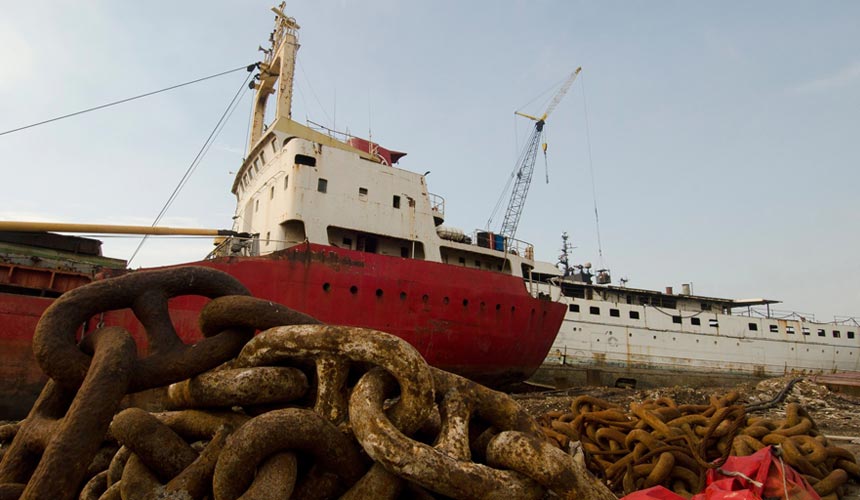Aliağa, located approximately 50 kilometers north of İzmir, is home to Turkey's primary ship-breaking industry. Established in 1976, the Aliağa Ship Breaking Yard is one of the world's largest, featuring 132 plots operated by 22 companies. The facility employs around 1,200 workers and utilizes the "landing method" for ship recycling.
The ship-breaking process in Aliağa involves dismantling decommissioned vessels, including luxury cruise ships, to salvage scrap metal and other materials. This industry has seen significant activity, especially following the COVID-19 pandemic, which led to an increase in cruise ships being retired and sent for dismantling.
One of the leading companies in this sector is Ship Recycling LTD, recognized as the largest ship dismantling facility in Turkey. With approximately 60,000 square meters dedicated to its operations, Ship Recycling LTD is capable of processing over 200,000 lightweight tons per year.
The Aliağa Ship Breaking Yard is a significant player in the global ship recycling industry, contributing to the sustainable disposal and recycling of maritime vessels.
What is a Ship-Breaking Company?
A ship-breaking company specializes in dismantling decommissioned vessels such as cargo ships, oil tankers, cruise ships, and naval vessels. The process involves:
- Disassembling Ships: Breaking down vessels into smaller parts.
- Recycling Materials: Salvaging valuable materials like steel, aluminum, copper, and machinery.
- Waste Management: Handling and disposing of hazardous waste, such as asbestos, oil residues, and chemicals, in compliance with environmental standards.
These companies play a crucial role in the circular economy, ensuring that end-of-life ships are recycled responsibly. They operate in designated facilities, often referred to as ship-breaking yards, and follow strict safety and environmental regulations.
What is a Ship Breaker?
A ship breaker is an individual or a company involved in the ship recycling process. Their responsibilities include:
- Assessing Ships: Evaluating vessels for their salvageable materials and determining their scrapping value.
- Planning Dismantling: Organizing the ship-breaking process to ensure efficiency and safety.
- Performing Dismantling Tasks: Cutting and removing parts of the ship using specialized tools and machinery.
Role in the Industry
Ship breakers are vital in managing the end-of-life phase of ships. They reduce waste, recycle materials, and ensure compliance with international treaties such as:
- Hong Kong International Convention: Regulates ship recycling to minimize environmental risks.
- Basel Convention: Controls the transboundary movement of hazardous waste.
Major Ship-Breaking Locations
The global ship-breaking industry is concentrated in regions like:
- South Asia: Alang (India), Chittagong (Bangladesh), and Gadani (Pakistan).
- Turkey: Aliağa, near İzmir.
- China: Various yards in coastal areas.
The industry contributes significantly to local economies while addressing environmental challenges.
Why does Turkey import so much scrap ship for demolition ?
Turkey imports large volumes of scrap ships for demolition primarily due to its strategic economic, geographical, and industrial advantages. Here are the key reasons:
1. Strong Demand for Steel Production
- Steel Recycling Industry: Turkey is one of the world's largest steel producers, with a heavy reliance on recycled scrap metal as raw material. Shipbreaking provides high-quality steel, which is vital for the country's steel mills.
- Lower Costs: Recycling steel from ships is often cheaper and more sustainable than mining and refining new ore.
- Domestic Needs: The Turkish construction and manufacturing industries require significant amounts of steel, which aligns with the output from shipbreaking.
2. Proximity to Shipping Routes
- Strategic Location: Turkey’s location at the crossroads of Europe, Asia, and the Middle East makes it an accessible destination for ship owners looking to dismantle their decommissioned vessels.
- Efficient Transport: Ships can be easily brought to Aliağa and similar facilities via major shipping routes in the Mediterranean and Aegean Seas.
3. Established Shipbreaking Infrastructure
- Modern Shipyards: Facilities like Aliağa have advanced infrastructure and a skilled workforce, making the shipbreaking process more efficient and compliant with environmental regulations.
- Capacity: Turkey's shipbreaking yards can handle a wide range of vessel sizes, attracting global ship owners.
4. Compliance with Environmental Standards
- EU Compliance: Turkey’s shipbreaking industry adheres to international environmental standards, including the Hong Kong International Convention and EU Ship Recycling Regulation. This compliance attracts European ship owners who must follow strict regulations.
- Controlled Disposal: Turkey has facilities to handle hazardous waste responsibly, including asbestos, oil sludge, and other materials commonly found in old ships.
5. Economic Benefits
- Job Creation: The shipbreaking industry in Turkey employs thousands of workers, boosting local economies.
- Foreign Exchange: By importing ships for dismantling, Turkey generates income through recycling and export of processed materials.
- Low Labor Costs: Compared to Western countries, Turkey offers lower labor costs, making its shipbreaking industry competitive globally.
6. Increased Availability of Ships
- COVID-19 Impact: The pandemic led to an increased retirement of older vessels, such as cruise ships, creating a boom in shipbreaking activity.
- Aging Fleet: Many ships are decommissioned as they reach the end of their operational life, adding to the demand for shipbreaking services in Turkey.
Turkey's ability to balance environmental responsibility, cost efficiency, and industrial output makes it a global leader in importing and recycling decommissioned ships.
